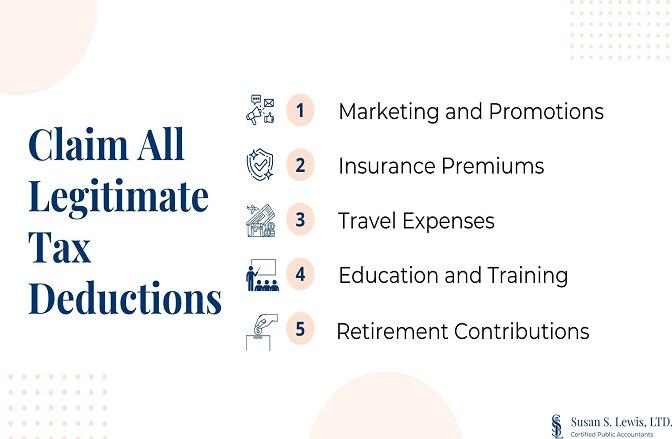Hey there, fellow self-starters! If you’re reading this, chances are you’re already knee-deep in the exhilarating, yet occasionally overwhelming, world of self-employment. First off, hats off to you for taking the leap! Now, let’s get real—one of the not-so-fun parts of being your own boss is figuring out those pesky taxes. But don’t worry; we’ve got you covered. In this article, we’re diving into tax planning tips specifically designed to help the self-employed maximize their deductions. Whether you’re a freelancer, a gig worker, or running a small business, these insights will help you save some serious cash come tax season. So, grab your favorite beverage, get comfy, and let’s make tax time a little less daunting—together!
Understanding the Basics: What Can You Deduct and Why It Matters
When you’re self-employed, understanding what expenses you can deduct is crucial for optimizing your tax savings. Think of deductions as opportunities to reduce your taxable income. Some common deductible expenses include:
- Home office: If you use part of your home exclusively for business, you can deduct rent or mortgage interest, utilities, and even repair costs.
- Equipment and supplies: Computers, software, office supplies, and other essential tools for your trade can decrease your taxable income.
- Travel expenses: Business-related travel, including transportation, lodging, and meals, add up throughout the year.
- Health insurance premiums: As a self-employed individual, you can deduct health insurance premiums for yourself and your family.
- Professional services: Fees for accountants, lawyers, or other professionals who assist you in running your business are also deductible.
| Expense Type | Example Items | Why It Matters |
|---|---|---|
| Home Office | Rent, Utilities | Reduces living space costs |
| Equipment & Supplies | Computers, Software | Offsets operational costs |
| Travel Expenses | Flights, Hotels | Compensates necessary travel |

Real-Life Strategies: Turning Everyday Expenses into Tax Deductions
As a self-employed individual, you have a unique opportunity to transform many of your everyday expenses into valuable tax deductions. Think about those work-related purchases such as office supplies, software subscriptions, or even a dedicated workspace at home. By keeping meticulous records and understanding what qualifies, you can significantly reduce your taxable income. The key is to be organized and consistent—keep all receipts and maintain a log of your business-related activities.
Here are a few common expenses you can look at:
- Home Office: If you have a dedicated space in your home for work, you can deduct a portion of your rent or mortgage interest, utilities, and even repairs.
- Travel: Business trips are deductible, covering everything from airfare to hotel stays and meals.
- Meals and Entertainment: Client dinners and business lunches can be partially deducted. Remember to note the purpose and attendees.
- Education: Courses, workshops, and certifications that enhance your business skills can qualify.
Take a look at this quick breakdown of potential deductions:
| Expense Type | Deductible Percentage |
|---|---|
| Home Office | Up to 100% |
| Travel | 100% |
| Meals and Entertainment | 50% |
| Education | 100% |

Smart Record Keeping: Building a Bulletproof Documentation System
One way to make sure you get all the deductions you’re entitled to is through smart record keeping. Keeping track of your expenses throughout the year can save you a lot of headaches during tax season. Make it a habit to capture and store all receipts and documents related to your business operations. Here are some tips:
- Use an app or software to snap photos of your receipts and categorize them instantly.
- Set up cloud storage folders for different types of expenses like travel, supplies, and meals.
- Keep a separate bank account and credit card for your business to simplify transactions tracking.
Utilizing a documentation system can also help you track important deadlines and responsibilities. For example, a simple table can be used to manage your quarterly tax estimates and necessary filings. Here’s a quick guide:
| Task | Due Date | Status |
|---|---|---|
| Q1 Estimated Tax Payment | April 15 | Completed |
| Q2 Estimated Tax Payment | June 15 | Pending |
Staying organized not only maximizes your deductions but also gives you peace of mind knowing everything’s in order.

The Power of Prepayments: How Paying Ahead Can Save You Big
When you prepay expenses like insurance or rent, you can often lock in lower rates, potentially saving you a significant amount of money over the long term. Think of it as an opportunity to secure a discount for being proactive. Here are some common areas where prepayments can make a big difference:
- Insurance premiums - Paying annually instead of monthly can often reduce the total cost.
- Subscriptions – Many services offer discounts for yearly payments.
- Rent – Some landlords provide a discount for upfront payments.
Not only can prepaying help reduce overall costs, but it can also offer tax benefits. By prepaying certain expenses, you may be able to deduct them in the current tax year, lowering your taxable income. Let’s break it down with a quick example:
| Expense | Monthly Payment | Annual Prepayment | Potential Savings |
|---|---|---|---|
| Insurance | $100 | $1,080 | 10% |
| Software Subscription | $25 | $270 | 10% |
Q&A
Q: Why is tax planning so important for self-employed individuals?
A: Great question! Tax planning is crucial for the self-employed because it helps you keep more of your hard-earned money. When you manage your taxes effectively, you’re not just paying the government; you’re making sure you’re not overpaying. Plus, it can save you a ton of stress when tax season rolls around.
Q: What are some common deductions that self-employed people often overlook?
A: Ah, the missed deductions! Some common ones include home office expenses, internet and phone bills, health insurance premiums, and even business meals. If you’re using part of your home for your business, track those expenses. Every little bit helps!
Q: How can I make sure I’m capturing all my business expenses accurately?
A: Keep good records! Use tools like accounting software or even apps designed for expense tracking. Also, keep your personal and business finances separate—this makes it easier to identify business expenses. And don’t forget to keep those receipts; they’re your backup if you ever get audited.
Q: Can I deduct the cost of my health insurance?
A: Absolutely! If you’re self-employed, you can deduct premiums you pay for medical, dental, and long-term care insurance for yourself, your spouse, and your dependents. Just a heads-up, though, it can’t exceed your net profit from the business.
Q: Is there a limit to how much I can deduct for a home office?
A: Sort of. The IRS allows you to use either the simple or regular method for home office deductions. The simple method is $5 per square foot of home used for business, up to 300 square feet. The regular method involves more math—calculating the actual expenses for your home office based on the percentage of your home’s total space that you use for business.
Q: What about retirement plans? Any tips for that?
A: Definitely! One of the perks of being self-employed is you have several retirement plan options like a SEP IRA, SIMPLE IRA, or Solo 401(k). Not only does this help you save for the future, but contributions are often tax-deductible, reducing your taxable income now.
Q: How do estimated tax payments work for self-employed people?
A: When you’re self-employed, you generally have to pay estimated taxes quarterly. Since you’re not having taxes withheld from a paycheck, you’ll need to send in payments to the IRS throughout the year. A good rule of thumb is to save about 25-30% of your income for these taxes to avoid any surprises.
Q: Any final pro tips for minimizing taxes?
A: Sure! Stay informed and organized. Take time to understand the tax codes, or better yet, work with a tax professional who knows the ins and outs of self-employment taxes. They can help you navigate the more complex parts and ensure you’re maximizing your deductions. And always plan ahead—don’t wait until the last minute to think about taxes!
Q: Anything else we should keep in mind?
A: Just remember that proper tax planning is a year-round activity. Keep an eye on your finances, set aside money for taxes, and be proactive about finding deductions. The more methodical you are, the easier and less stressful tax time will be!
Final Thoughts
Alright, there you have it! Navigating the world of tax planning as a self-employed individual might feel like trying to juggle flaming torches while riding a unicycle, but with these tips on maximizing deductions, hopefully, the act is a bit less daunting! Remember, keeping organized records and knowing what you can deduct are your best friends come tax time. And hey, don’t be shy about reaching out to a tax professional—they’re the trapeze net ready to catch any slips. So go ahead, tackle those taxes with confidence, and keep more of that hard-earned cash in your pocket! Happy planning, and good luck!



[…] we’re gonna dive into some practical tips and tricks to help you make the most of your hard-earned money, ensuring you’ll be sipping margaritas on the beach instead of pinching pennies. So grab a […]
[…] fit doesn’t have to break the bank. Walking and running are two of the simplest and most effective ways to get your daily dose of exercise without […]
[…] face it—nobody enjoys spending their hard-earned money on medical bills. Yet, many of us overlook the simple, everyday practices that can help […]